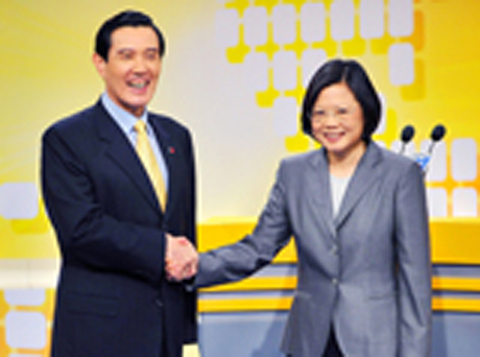|
Ma, Tsai hold debate on signing ECFA
with China
ROAD TO NOWHERE: Tsai Ing-wen said the president’s
pro-Beijing policies had siphoned off Taiwanese resources and deepened
commercial and trade reliance on China
STAFF WRITER WITH CNA
Monday, Apr 26, 2010, Page 1

President and Chinese Nationalist Party (KMT)
Chairman Ma Ying-jeou, left, shakes hands with Democratic Progressive Party
Chairperson Tsai Ing-wen during a televised debate over an economic cooperation
framework agreement, at the Taiwan Public Television station in Taipei
yesterday.
PHOTO: REUTERS
President Ma Ying-jeou (馬英九) and Democratic Progressive Party (DPP) Chairperson
Tsai Ing-wen (蔡英文) crossed swords yesterday in a highly anticipated debate on a
proposed economic cooperation framework agreement (ECFA).
The two hour, 30 minute debate was aired live on Public Television Service,
marking the first debate on policy between a president and an opposition party
head in the nation’s history.
In his opening statement, Ma pledged to uphold Taiwan’s interests at all costs
in negotiating an ECFA with China, an arrangement he described as essential to
reviving Taiwan’s trade competitiveness.
“If the ECFA talks do not secure overall economic benefits for Taiwan, I would
not accept it [the agreement] and would rather let it fall apart,” Ma said.
For her part, Tsai said Ma’s emphasis on the importance of signing an ECFA with
China was based on a belief that “Taiwan can only gain access to the world via
China.”
She challenged Ma to tell the public that this is Taiwan’s “only choice” and
that no other options exist.
Once the agreement is signed, Taiwan will be required to open its market fully
within a 10-year time-frame, Tsai said.
“But the president has yet to tell us how large the impact will be,” she said.
Most attention was given to the 106-minute question-and-answer session during
which each asked the other five questions and five follow-up questions related
to the trade deal.
Accusing the government of creating a false sense of urgency in concluding an
ECFA with Beijing, Tsai said China could have ulterior motives in making
unilateral concessions to Taiwan in the talks. She also accused Ma’s pro-China
policy of having drained Taiwanese resources and deepened the nation’s
commercial and trade reliance on China.
In response, Ma said that his government has been ever-vigilant in opening
Taiwan to China and expressed confidence that Taiwanese people are more than
capable of dealing with any adverse impact from an ECFA with China.
Ma said that rather than always blaming the government for keeping the
opposition party in the dark on the pact, Tsai should instead order DPP
lawmakers not to hinder legislative hearings on ECFA issues.
Ma, however, failed to respond to Tsai’s question on whether his administration
has any backup plan if the ECFA talks with China break down.
In his questions, Ma said the DPP was responsible for the negative impression
people have of the planned pact. In response, Tsai said public insecurity was
real and not something any political party could conjure out of thin air.
Concerned that the terms of the agreement will not be reviewed by the
Legislature before the deal is signed, Tsai asked Ma what would happen if the
Legislature rejected an ECFA.
“Will you redo it all over again?” she asked.
Ma sidestepped the question, but reasserted his administration’s rationale for
the pact.
“Our strategy is to not let Taiwan be left behind ... We will be unable to meet
the challenges ahead or cope with the international situation if we do not sign
the ECFA,” he said.
|
![]()
![]()
![]()